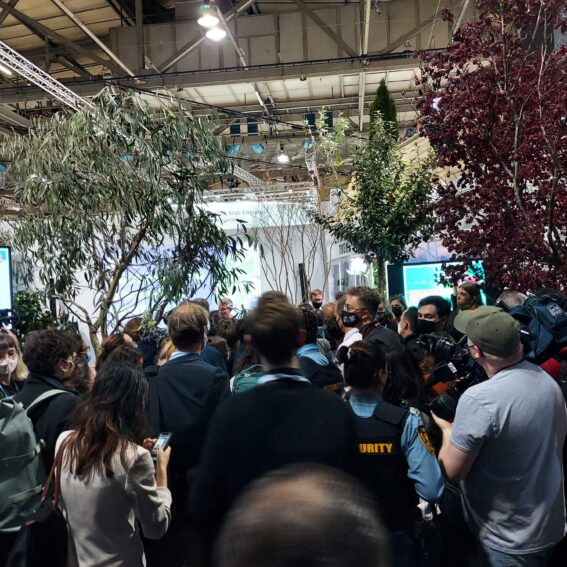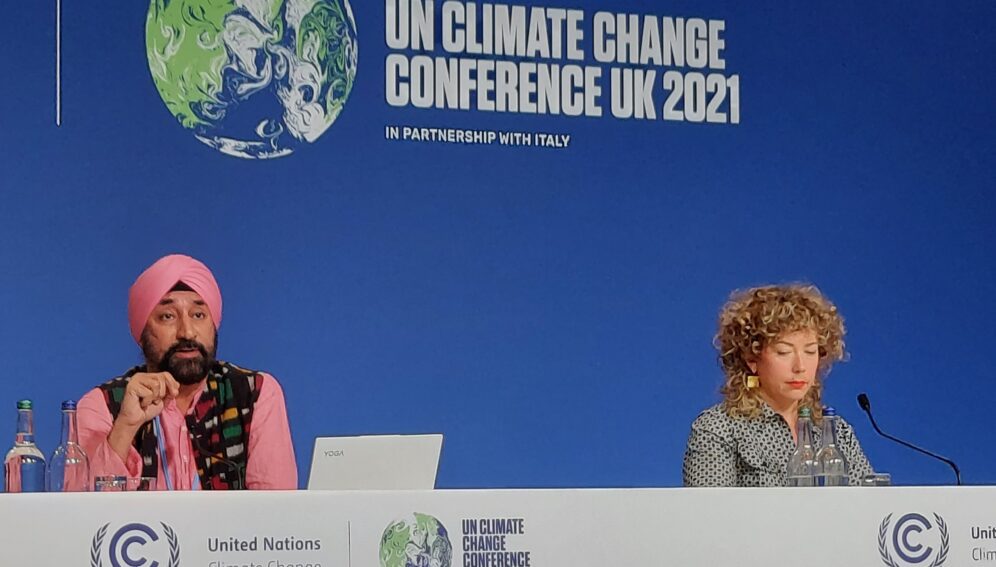By: Fiona Broom
Send to a friend
The details you provide on this page will not be used to send unsolicited email, and will not be sold to a 3rd party. See privacy policy.
A participation revolution is needed to stop the “outrageous” exclusion of civil society and the global South from major international talks, development advocates have said amid accusations that COP26 is the least inclusive climate summit in a decade.
Vaccine and visa complications, coupled with COVID-19 restrictions on capacity in official negotiating spaces, have left civil society and scientists from the global South outside of core proceedings in Glasgow, UK, say advocates.
They believe the UN summit’s organisers have legal obligations to ensure that the people who are most impacted by climate change can contribute to negotiations and working groups.
Sébastien Duyck, a senior attorney at the Center for International Environmental Law, said: “People have come from all regions, despite all of the hurdles – the economic costs of being here in Glasgow, the health risks associated with going back to their communities, to participate in the process.”
But he said that of the thousands of accredited observers from the global South, indigenous communities and environment organisations, “four representatives have been allowed in the entire room where negotiations take place. Not just the high-level segment of this COP, the entire working area where actual negotiations take place.”
“We’ve seen the least inclusive beginning of a conference of parties since over a decade.”
Sébastien Duyck, senior attorney, Center for International Environmental Law
Duyck said with at least six simultaneous negotiations happening at a time, that meant global South and civil society were absent from some processes.
“We’ve seen the least inclusive beginning of a conference of parties since over a decade,” Duyck said. “COVID-related restrictions cannot justify the fact that an entire network of environmental and development organisations will be allowed to send four delegates in the negotiating area.”
One of the only civil society actions so far permitted in the Blue Zone – the restricted area at COP26 – was called off on Wednesday, as security struggled to control the number of reporters and supporters who gathered to see indigenous communities protest an event on carbon markets.

Press swarm the Nature pavilion, in the restricted Blue Zone at COP26, ahead of an expected protest by Indigenous peoples.
Duyck called on the UN Framework Convention on Climate Change Secretariat and the UK as hosts to take immediate action to ensure that the voices of communities living with the impacts of climate change are “effectively and meaningfully heard in negotiating rooms”.
The UK government had said the event would be the most inclusive COP ever.
The UNFCCC Secretariat did not respond to a SciDev.Net request for comment by the time of publication. The UK government, in a statement on the COP26 website, said it was ”working tirelessly” with partners, including the Scottish government and the UN, “to deliver a safe and inclusive summit”.
The COP26 organising team on Tuesday apologised for major delays for delegates entering the venue, and technical issues which had made accessing the digital platform, where events are being streamed, difficult.
Danny Sriskandarajah, chief executive of UK-based charity Oxfam GB, told SciDev.Net that participation was vital at the summit because the people who had contributed “almost nothing” to the climate crisis were living with the disastrous impacts.
“Their voices are hardly heard in these sorts of environments. We’ve got to fix that participation gap if we’re going to have any sort of successful process around climate change,” he said.
I am an indigenous activist from N. Uganda. This is my farm, my crops have failed due to stunted growth bcoz of too much rain.
We are suffering because of the climate crisis and yet my community won’t be represented @COP26 #COP26 @AlexandriaV2005 @vanessa_vash @NaomiAKlein pic.twitter.com/DW7BS88LHI
— Mustafa Gerima (@GerimaMustafa) November 1, 2021
Intergovernmental processes generate a “double democratic deficit”, Sriskandarajah says, as the poorest and most marginalised people are excluded from their national political systems, causing greater invisibility at the global level.
“The people whose lives are being affected now are two steps removed from influencing these sorts of processes, which at their heart should be about justice to those people,” he added.
“We need a participation revolution.”
Several delegates from the global North have told SciDev.Net that their colleagues from the global South had visa applications denied or delayed, causing them to miss speaking engagements.
The executive director of the Act On Sahel movement, Kaossara Sani, of Togo, said she was a “missing voice in the climate debate and negotiations” and questioned why the most affected by climate change were being excluded.
This piece was produced by SciDev.Net’s Global desk.















